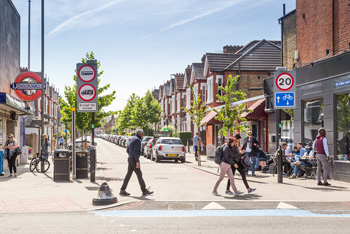Transport for London (TfL) is consulting on plans to introduce 28km of new 20mph speed limits within five London boroughs.
The proposed changes would mean that almost all the roads in Camden, Islington, Hackney, Tower Hamlets and Haringey will have a consistent 20mph speed limit on both the TfL road network and the boroughs’ networks.

Tooting Bec Station. Image: TfL
A 20mph limit would be introduced on sections of the A503, A501, A41, A1, A10, A11 and A1203.
Subject to the consultation, works to introduce the new speed limits could begin in February 2023.
TfL said the new speed limits would be supported by new signs and road markings, and that it would work closely with the Metropolitan Police to ensure that drivers understand and comply with the new lower speed limits.
Head of healthy streets investment Penny Rees said: ‘The introduction of 20mph speed limits would not only save lives but also encourage Londoners to travel in more active and sustainable ways.
‘Making London's streets safer for people walking and cycling is our top priority and 20mph speed limits significantly reduce road danger.’
In March 2020, TfL introduced a 20mph speed limit on all its roads within the central London Congestion Charging zone and 80km of its roads are now 20mph.
It said it is now working to lower speeds on 220km of its roads in inner and outer London by 2024 and launched 13.7km of new lower speed limit schemes in February.
TfL said collision data from around the world shows that the speed at which people are driving or riding is the single most important factor in whether a collision takes place and how severely people are injured.
However, research published last week by the Centre for Public Health at Queen's University Belfast found that 20 mph speed limits ‘have seemingly little impact on crashes, casualties or driver speed’.
Traffic enforcement specialist Jenoptik pointed out that the researchers said planners should consider enforcement in their designs. Account manager Timo Thornton said the report ‘confirmed to me what I have long suspected – that a formal enforcement regime is the best way to lock in the benefits of introducing 20 mph limits’.
RAC road safety spokesman Simon Williams called the study’s findings surprising, ‘as they appear to suggest that drivers on 20mph roads in Belfast hardly slowed down at all, despite the lower speed limit, which is at odds with other reports’.
He added: ‘It seems there is a serious problem with compliance as we would expect that even without enforcement average speeds would drop.’
Register now for full access
Register just once to get unrestricted, real-time coverage of the issues and challenges facing UK transport and highways engineers.
Full website content includes the latest news, exclusive commentary from leading industry figures and detailed topical analysis of the highways, transportation, environment and place-shaping sectors.
Use the link below to register your details for full, free access.
Already a registered? Login